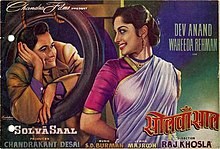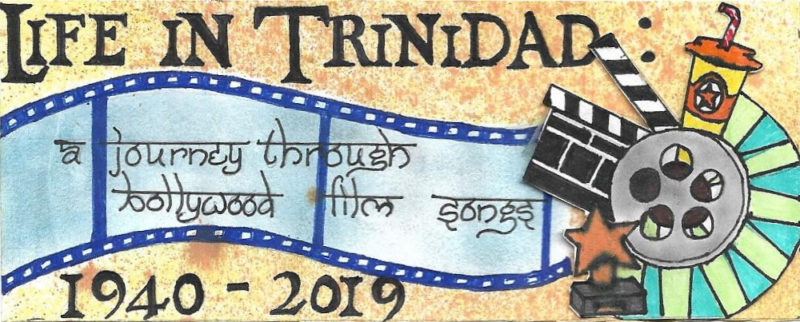Hai Apna Dil To Awara
| Song Title | Hai Apna Dil To Awara |
| Movie Title | Solva Saal |
| Date Released (India) | February 3, 1958 |
| Date Released (Trinidad) | Unknown |
| Singer | Hemant Kumar |
| Lyricist | Majrooh Sultanpuri |
| Composer | S. D. Burman |
| Starring | Dev Anand, Waheeda Rehman, Tun Tun, and Jagdeep |
Music video of Hai Apna Dil To Awara from the movie Solva Saal.
Song Lyrics
| Hemant Kumar | Hemant Kumar |
| Hai apnaa dil to aawaaraa Hai apnaa dil to aawaaraa Na jaane kis pe aayegaa Hai apnaa dil to aawaaraa Na jaane kis pe aayegaa | My heart is just a vagabond My heart is just a vagabond I wonder to whom he will take a liking My heart is just a vagabond I wonder to whom he will take a liking |
| Haseeno.N ne bulaayaa, gale se bhii lagaayaa Bahut samjhayaa, yahii.N na samajhaa Haseeno.N ne bulaayaa, gale se bhii lagaayaa Bahut samjhayaa, yahii.N na samajhaa Bahut bholaa hai bechaaraa Na jaane kis pe aayegaa Hai apnaa dil to aawaaraa Na jaane kis pe aayegaa | Many beautiful women called me, they even embraced me They tried hard to explain, but my heart did not understand Many beautiful women called me, they even embraced me They tried to coax me, but my heart wouldn’t listen It’s too innocent, poor thing I wonder to whom he will take a liking My heart is just a vagabond I wonder to whom he will take a liking |
| Ajab hai diiwaanaa, na ghar na Thiikaanaa Zameen se begaanaa, falak se judaa Ajab hai diiwaanaa, na ghar na Thiikaanaa Zameen se begaanaa, falak se judaa Yeh ek tuutaa huaa taaraa Na jaane kis pe aayegaa Hai apnaa dil to aawaaraa Na jaane kis pe aayegaa | My strange, crazed heart has neither house nor abode He has no roots in the earth, he is distanced from heaven My strange, crazed heart has neither house nor abode He has no roots in the earth, he is distanced from heaven He is a shooting star I wonder to whom he will take a liking My heart is just a vagabond I wonder to whom he will take a liking |
| Zamaanaa dekhaa saaraa, hai sab kaa sahaaraa Yeh dil hii humaaraa, huaa na kisii kaa Zamaanaa dekhaa saaraa, hai sab kaa sahaaraa Yeh dil hii humaaraa, huaa na kisii kaa Safar mei.N hai yeh banjaaraa Na jaane kis pe aayegaa Hai apnaa dil to aawaaraa Na jaane kis pe aayegaa | He has seen the whole world, he is everyone’s refuge Only this heart of mine never gave himself to anyone He has seen the whole world, he is everyone’s refuge Only this heart of mine never gave himself to anyone He is a gypsy on a journey I wonder to whom he will take a liking My heart is just a vagabond I wonder to whom he will take a liking |
| Hua jo kabhii raazii, to milaa nahii.N qaazii Jahaa.N pe lagii baazii, wohii.N pe haaraa Hua jo kabhii raazii, to milaa nahii.N qaazii Jahaa.N pe lagii baazii, wohii.N pe haaraa Zamaane bhar kaa naakaaraa Na jaane kis pe aayegaa Hai apnaa dil to aawaaraa Na jaane kis pe aayegaa | When I fell in love, no priest could be found My heart lost its gamble just when it staked its all When I fell in love, no priest could be found My heart lost its gamble just when it staked its all He is rejected by the whole world Who knows if he will ever find someone My heart is just a vagabond I wonder to whom he will take a liking |
Hemant Kumar |
Hai apnaa dil to aawaaraa Hai apnaa dil to aawaaraa Na jaane kis pe aayegaa Hai apnaa dil to aawaaraa Na jaane kis pe aayegaa |
Haseeno.N ne bulaayaa, gale se bhii lagaayaa Bahut samjhayaa, yahii.N na samajhaa Haseeno.N ne bulaayaa, gale se bhii lagaayaa Bahut samjhayaa, yahii.N na samajhaa Bahut bholaa hai bechaaraa Na jaane kis pe aayegaa Hai apnaa dil to aawaaraa Na jaane kis pe aayegaa |
Ajab hai diiwaanaa, na ghar na Thiikaanaa Zameen se begaanaa, falak se judaa Ajab hai diiwaanaa, na ghar na Thiikaanaa Zameen se begaanaa, falak se judaa Yeh ek tuutaa huaa taaraa Na jaane kis pe aayegaa Hai apnaa dil to aawaaraa Na jaane kis pe aayegaa |
Zamaanaa dekhaa saaraa, hai sab kaa sahaaraa Yeh dil hii humaaraa, huaa na kisii kaa Zamaanaa dekhaa saaraa, hai sab kaa sahaaraa Yeh dil hii humaaraa, huaa na kisii kaa Safar mei.N hai yeh banjaaraa Na jaane kis pe aayegaa Hai apnaa dil to aawaaraa Na jaane kis pe aayegaa |
Hua jo kabhii raazii, to milaa nahii.N qaazii Jahaa.N pe lagii baazii, wohii.N pe haaraa Hua jo kabhii raazii, to milaa nahii.N qaazii Jahaa.N pe lagii baazii, wohii.N pe haaraa Zamaane bhar kaa naakaaraa Na jaane kis pe aayegaa Hai apnaa dil to aawaaraa Na jaane kis pe aayegaa |
| Hemant Kumar |
| Hai apnaa dil to aawaaraa Hai apnaa dil to aawaaraa Na jaane kis pe aayegaa Hai apnaa dil to aawaaraa Na jaane kis pe aayegaa |
| Haseeno.N ne bulaayaa, gale se bhii lagaayaa Bahut samjhayaa, yahii.N na samajhaa Haseeno.N ne bulaayaa, gale se bhii lagaayaa Bahut samjhayaa, yahii.N na samajhaa Bahut bholaa hai bechaaraa Na jaane kis pe aayegaa Hai apnaa dil to aawaaraa Na jaane kis pe aayegaa |
| Ajab hai diiwaanaa, na ghar na Thiikaanaa Zameen se begaanaa, falak se judaa Ajab hai diiwaanaa, na ghar na Thiikaanaa Zameen se begaanaa, falak se judaa Yeh ek tuutaa huaa taaraa Na jaane kis pe aayegaa Hai apnaa dil to aawaaraa Na jaane kis pe aayegaa |
| Zamaanaa dekhaa saaraa, hai sab kaa sahaaraa Yeh dil hii humaaraa, huaa na kisii kaa Zamaanaa dekhaa saaraa, hai sab kaa sahaaraa Yeh dil hii humaaraa, huaa na kisii kaa Safar mei.N hai yeh banjaaraa Na jaane kis pe aayegaa Hai apnaa dil to aawaaraa Na jaane kis pe aayegaa |
| Hua jo kabhii raazii, to milaa nahii.N qaazii Jahaa.N pe lagii baazii, wohii.N pe haaraa Hua jo kabhii raazii, to milaa nahii.N qaazii Jahaa.N pe lagii baazii, wohii.N pe haaraa Zamaane bhar kaa naakaaraa Na jaane kis pe aayegaa Hai apnaa dil to aawaaraa Na jaane kis pe aayegaa |
| Hemant Kumar |
| My heart is just a vagabond My heart is just a vagabond I wonder to whom he will take a liking My heart is just a vagabond I wonder to whom he will take a liking |
| Many beautiful women called me, they even embraced me They tried hard to explain, but my heart did not understand Many beautiful women called me, they even embraced me They tried to coax me, but my heart wouldn’t listen It’s too innocent, poor thing I wonder to whom he will take a liking My heart is just a vagabond I wonder to whom he will take a liking |
| My strange, crazed heart has neither house nor abode He has no roots in the earth, he is distanced from heaven My strange, crazed heart has neither house nor abode He has no roots in the earth, he is distanced from heaven He is a shooting star I wonder to whom he will take a liking My heart is just a vagabond I wonder to whom he will take a liking |
| He has seen the whole world, he is everyone’s refuge Only this heart of mine never gave himself to anyone He has seen the whole world, he is everyone’s refuge Only this heart of mine never gave himself to anyone He is a gypsy on a journey I wonder to whom he will take a liking My heart is just a vagabond I wonder to whom he will take a liking |
| When I fell in love, no priest could be found My heart lost its gamble just when it staked its all When I fell in love, no priest could be found My heart lost its gamble just when it staked its all He is rejected by the whole world Who knows if he will ever find someone My heart is just a vagabond I wonder to whom he will take a liking |
About The Lyrics
The Hindi lyrics of this song were obtained from a post at Facebook [1]. The English translation of the lyrics was mostly obtained from the Thomas Daniel restored version of the original movie [2]. Some verses were obtained from the Mr. and Mrs. 55 – Classic Bollywood Revisited! website [3] and some were adapted from [1]. Editorial enhancements were made by P. Mohan [4].
Fun Facts
The song’s central phrase, “Awara” (आवारा), is a Persian-derived word meaning “vagrant” or “vagabond.” The term became a hugely popular and enduring character archetype in Hindi cinema after the success of Raj Kapoor’s 1951 film, “Awara.” This song from 1960 beautifully reinterprets the “awara” as a lover who is a wanderer by nature, not just a social outcast. The lyrics further describe this heart as a “Deewana” (दीवाना), a Persian word for “crazy” or “mad,” highlighting its irrational nature. It is said to have “neither house nor Thikana” (ठिकाना), a Hindi word for “abode,” emphasizing its total lack of a fixed home or sense of belonging.
The song’s romantic imagery continues by calling the heart a “shooting star” and, later, a “Banjara” (बंजारा), a Hindi word for “gypsy” or “nomad.” This reinforces the theme of a traveling spirit. The lyrics also use a subtle historical reference with the word “Qazi” (काजी), an Arabic term for a “judge” or a magistrate who presides over a marriage ceremony. The line about the heart being ready to love but being unable to find a “qazi” adds a layer of sorrow, suggesting that fate has prevented it from settling down. The song ends by calling the heart a “Naakara” (नाकारा), a Persian word for “useless” or “rejected,” in a final, humorous admission of its lovelorn failures.
References
[1] https://www.facebook.com/Hai-apna-dil-to-awara-801382173247702/
[2] https://www.youtube.com/watch?v=IfZtrYBBZOM
[4] Mohan, Permanand. Life in Trinidad: A Journey Through Bollywood Film Songs and Trini Calypso. https://lifeintrinidad.org/

